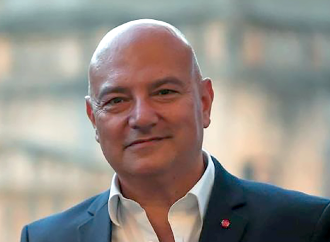
Background — A Cross‑Cultural Academic Exchange
On 27 March 2025 the University of Malta welcomed Professor Alfonso Campisi, a distinguished full‑professor of Romance and Italian Philology from the University of Manouba in Tunisia. Campisi’s reputation as a leading scholar on Sicilian language and culture, coupled with his longstanding involvement in cross‑border research on migration, makes his visit a significant step for the University of Malta and its Erasmus+ commitments.
Academic Credentials and Research Profile
Born in Trapani, Italy, Professor Campisi holds dual Italian‑Tunisian nationality. He is appointed President of the first Chair in the world dedicated to Sicilian Language and Culture and chairs the Scientific Council of the Accademia della Lingua Siciliana in Italy. In Tunisia he serves on the National Doctoral Commission ‘Languages’ and directs the PhD program in Italian. His collaborations span the University of Pennsylvania, Paul Valéry Montpellier 3, and the International Association for Italian Language and Literature Studies (A.I.S.L.L.I.) in UNESCO.
Campisi’s recent publications focus on the identities, languages, and histories of Tunisian and Sicilian emigrants across Tunisia, France, and the United States. Works such as Parole e Immagini di una Storia Minore and Migrazioni e appartenenze: identità composite e plurilinguismo provide a comparative lens that aligns closely with Malta’s own historical migration narratives.
Meeting the Maltese Community in Malta
During his stay, Professor Campisi met with faculty from the University of Malta and the Mediterranean Institute to examine the Maltese diaspora that settled in Tunisia. Interviews with Maltese‑born individuals living in Tunisia are slated for a forthcoming monograph that will shed light on cultural transfer across the Mediterranean. The shared Mediterranean heritage positions Malta as an ideal partner for this line of inquiry.
Implications for Maltese Students and Researchers
Students pursuing studies in Mediterranean and migration studies will benefit from access to Campisi’s expertise. Faculty collaborations can lead to joint seminars, comparative research projects, and the exchange of best practices in teaching multilingual and multicultural curricula.
Erasmus+ — A Vehicle for Mobility and Knowledge Transfer
The University of Malta is a signatory of the Erasmus+ program, which funds exchange placements, collaborative projects, and mobility initiatives across Europe. Professor Campisi’s visit was facilitated through the Erasmus+ Institutional Mobility Programme (ICM), allowing him to spend time on campus, engage with local scholars, and return with a deeper understanding — ready to implement best practices at the University of Manouba.
Key Benefits of Erasmus+ for the University of Malta
1. Financial Support – Erasmus+ grants cover travel, living, and project development costs for participants. 2. Academic Networking – Participants establish long‑term research collaborations that increase publication output and grant competitiveness. 3. Student Experience – Malta’s students gain exposure to diverse academic systems, enhancing employability and cultural competence.
These benefits are evidenced by the collaborative work on Maltese migration, which resulted in joint publications and conference presentations that raise the profile of both universities in the international community.
Why the Maltese Community Matters in Academic Research
Malta’s unique position as a crossroads of cultures makes it a living laboratory for migration and identity studies. The Maltese diaspora’s contribution to North African societies, especially in Tunisia, has received scant academic attention. Professor Campisi’s forthcoming work will fill this gap, offering comparative insights that can inform policy, cultural programs, and educational curricula in both Malta and Tunisia.
Potential Applications of the Research
– Social policy design for migrant integration in Malta and North Africa.
– Curriculum development in language and history departments.
– Cultural exchange programs that celebrate shared Mediterranean heritage.
Future Collaboration Opportunities
Building on Professor Campisi’s visit, the University of Malta is exploring the following initiatives:
- Joint master’s programme in Mediterranean Studies, co‑headed by the Faculties of Humanities and Social Sciences.
- Research consortium on ‘Borderwriting: Creations, Migrations, Cultural Transfers’ covering Malta, Tunisia, and France.
- Annual symposium on Transmediterranean Migration inviting scholars from the University of Manouba and other Mediterranean institutions.
These projects will be open to Erasmus+ funding and will promote academic excellence while strengthening ties across the region.
Take Action — Engage with Erasmus+ at the University of Malta
If you are an aspiring student or researcher interested in Mediterranean studies, migration, or multilingualism, there are several ways you can get involved:
- Apply for an Erasmus+ exchange placement through the University of Malta study page and experience a world‑class academic environment.
- Explore collaborative projects in the Department of Romance Studies and join ongoing research on migration and diaspora.
- Attend the annual Trans‑Mediterranean Symposium to network with scholars and present your work.
These avenues not only enrich your education but also contribute to a better understanding of migration patterns that shape societies across the Mediterranean.
Conclusion — A Legacy of Cross‑Border Scholarship
Professor Alfonso Campisi’s visit to the University of Malta exemplifies the spirit of Erasmus+: shared knowledge, cultural exchange, and a commitment to advancing research that benefits multiple communities. The dialogue between Maltese and Tunisian scholars promises to deepen our collective understanding of migration, identity, and cultural resilience. For the University of Malta, this partnership reaffirms its role as a hub for Mediterranean scholarship and a catalyst for EU‑wide academic collaboration.
Interested scholars and students can take the next step by visiting the University of Malta’s study portal or contacting the Office of International Relations for more information on Erasmus+ opportunities.

